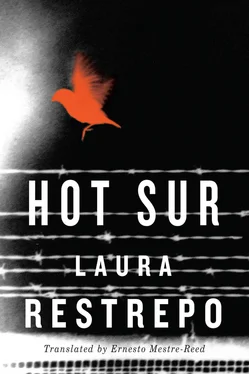Although Socorro had not admitted it, Rose had come to the conclusion that this woman had not been able to stand the way her husband looked at Bolivia, that Bolivia was fertile and she wasn’t, and that it was painful to compare her sickly lean figure with the brimming roundness and spectacular smile of her rival. No doubt Bolivia had noticed, sensed something was wrong, that the tension as the months passed had become way too evident, almost tangible, as Socorro had mentioned.
Socorro told him that one night, when she and her husband returned from a party, they noticed that Bolivia had packed up her suitcase and gone, leaving a note that said, “Love you, thank you very much for everything, thank you and see you soon and may God give you many years of wedded happiness.” From then on, Socorro only saw her once in a while, and of her life and adventures only learned fragments. “She was a survivor, that’s what Bolivia was, a survivor,” Socorro repeated various times to Rose, and he remembered reading the same phrase in María Paz’s manuscript, and asked himself what it meant exactly, and if perhaps it had to do with the seventeen pages that were missing from the manuscript.
“There’s seventeen pages missing?”
Socorro pretended she didn’t know, but she turned red and drops of sweat moistened the bleached fuzz under her nose.
“Do you know by any chance what happened to those seventeen pages?”
“Sometimes things get lost, you know…”
“Mrs. Salmon, I’d appreciate it if you told me the truth.”
“You have to understand, Mr. Rose, those pages were the most compromising part of the story. I was afraid that… in the end… Look, the truth is I burned them, Mr. Rose.”
“You burned them.”
“Yes. I admit it. There were revelations about things that were too personal and serious and that affect me directly. Painful things for me. And others that I don’t remember. Things that would damage the memory of my best friend, you know what I mean. Let’s drop this topic, please, Mr. Rose.”
“Of course, we’ll leave it there. Just one more question before I say good-bye. What made you decide to finally send off the manuscript?”
“That’s an easy question. I did it because María Paz asked me to, and I didn’t feel I could deny her request.”
“But it took you a few weeks to mail it.”
“I suppose remorse, which bites like a dog, got the best of me, and I had no choice but to look for your address, Mr. Rose. Odile, my neighbor who reads a lot and knows her way around, helped me with that. She has a computer and found you on that goggle thing, is that what it’s called? And then I sent off the manuscript right away. Better late than never, right?”
“Do you think you did it because you were afraid that María Paz may have found out if you hadn’t?”
“What makes you think that? It has been a while since I’ve seen her. Haven’t seen her since the last time I visited her in prison. You do favors. If you can, you do favors. I once gave María Paz a mink coat so she could keep warm in the winter, or so that she could sell it if she needed the money. Doesn’t that count? I’m not going to say that the mink was in the best of shape. But in any case it was a nice gesture on my part. Like I said, we do what we can. And do you know who got Bolivia her first job in the United States after she got here without papers? Yes sir, it was me. It was a humble job, but a job still, cleaning the apartment of an old woman who lived on West Fifty-Fifth Street. But I’m boring you, or do you want me to keep going?”
“As long as you don’t lose your way, Mrs. Salmon.”
“The woman’s name was Hannah and she was Jewish. And it took Bolivia a while to realize that when she got to the apartment everything was clean and organized. Bolivia asked her one day, ‘Ma’am, how do you expect me to do my job if you do it for me beforehand?’ The old woman responded that she could not stand the thought of someone coming into her home and finding it dirty. So Bolivia came to understand that her boss was just looking for company, because there’s nothing worse than loneliness, as you know, Mr. Rose. So Bolivia never asked again and learned how to quickly clean what had already been cleaned and organize what had already been organized. Afterward, they went for a stroll in Central Park, always talking about trees or the color of the leaves according to the season.
“‘I’d say that is a poplar leaf and it is viridian in color,’ Hannah ventured.
“‘I don’t know what viridian is, I’d say it’s emerald green,’ Bolivia countered.
“‘Same thing, Bolivia, viridian and emerald are the same green. And this leaf from a weeping willow — isn’t it chrome green?’
“‘More like a lime green.’
“‘What about a swamp green?’
“‘Agreed, Señora Hannah, a swamp green.’
“And so it went, with sycamores, maples, elms, exchanging opinions on the range of greens, lemon green, mint green, malachite. Further on in the year they tackled the possibilities of the ochres and golds of fall, and in the winter the only things left were gray and white.
“‘Do you know that Eskimos can distinguish nine shades of white and have a name for each of them?’
“‘That’s over the top, nine shades of white!’”
After their daily walk in Central Park, having worked up a hunger, the two women, the illegal Colombian and the lonely American, walked arm in arm to the Carnegie Deli, where they had pastrami with dill pickles or matzo balls, often finishing everything off with a strawberry cheesecake. Señora Hannah always paid, of course, and since neither of them ate very much, there were mountains of food left over, which the waiter wrapped in aluminum foil so that Bolivia could take it with her on the 7 train from Times Square, which left her off almost at the door of her place, a room in Jackson Heights that she shared with a Dominican woman and her niece, who often had temporary guests or family members and friends who stayed longer. The interesting thing was the food chain that formed from that point on, because in that room in Jackson Heights an average of five people dined nightly for four and a half months without any of them once setting foot in a supermarket; they had enough with the water from the tap and the doggy bags Bolivia brought from Carnegie Deli.
“A terrible influence on Bolivia,” Socorro told Rose. “Trust me when I tell you. A horrible influence, those two Dominican women. They were called Chelo and Hectorita. They came here a couple of times with Bolivia. Chelo was the aunt, Hectorita the niece.”
Bolivia sent almost all of the salary from Fifty-Fifth Street to Colombia to support her two daughters. She lived on what was left, and tried to put some aside for savings. But very little remained, and there was never enough left for the main purpose: to pay the visas and plane tickets for her daughters. To that end, she had opened a savings account that remained meager, an anorexic account that emptied any time one of the girls got sick or had a birthday.
“‘There isn’t going to be a year in which your girls won’t get sick or have a birthday,’ the Dominicans insisted. ‘As long as you are a servant, you’ll never save. Drop that, girl, get up off your ass and look for something better.’
“‘And poor Señora Hannah?’ Bolivia protested.
“‘Poor Señora Hannah is rich. You’re the one who’s poor.’
“‘And what are we going to eat without the pastrami and matzo balls?’
“‘We’ll figure out something.’
“‘But Señora Hannah and I are friends…’
“‘Friends, my ass. Let’s call things as they are. Señora Hannah is the señora and you are the maid. But from now on you are going to be a factory worker.’
Читать дальше












